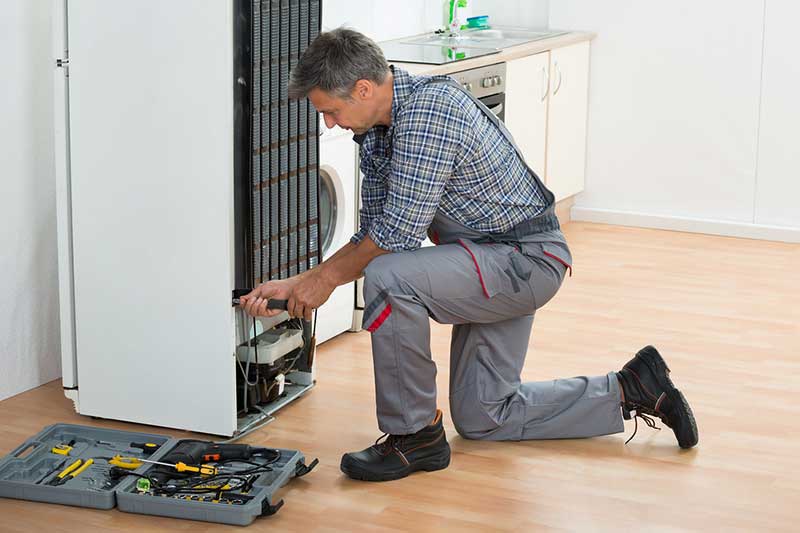In recent years, HVAC technicians have trained under a new title, HVAC/R. Heating, ventilation, air conditioning, and refrigeration technicians can install, repair, and maintain a variety of systems at the residential, commercial, and industrial levels. One of the best things about HVAC/R is the opportunity to choose a specialization and build your career around it.
HVAC technicians can work with refrigeration equipment as well as traditional HVAC systems in a variety of settings. For example, specializing in refrigeration repair can create opportunities for you to work as an on-call provider of installation and repairs or on-site at a hospital, factory, warehouse, or other location with mechanical staff.
What Does an HVAC/R Technician Do?
In addition to repairing refrigeration equipment, HVAC/R techs also monitor, inspect and repair heating, air conditioning, and ventilation systems. These can be domestic units that include an outside unit and ductwork or a multi-part, complex industrial system designed to filter out contaminants and keep a workplace up to sanitation code. In medical settings, HVAC/R mechanics are vital members of the maintenance staff. Without them, any system malfunction could jeopardize the health of staff and patients.
As a specialist, an HVAC/R Technician is responsible for ensuring every element of the HVAC system works properly, diagnosing symptoms, and performing routine preventative maintenance to ensure that the entire system always works the way it should.
HVAC/R Tech Job Responsibilities
Some of the tasks you may perform as a HVAC/R technician include:
- Reading mechanical blueprints and drawing diagrams.
- Diagnosing and repairing refrigerant leaks.
- Welding and soldering piping to make repairs.
- Replacing and maintaining evaporators, condensers, and coils.
- Working with boilers and performing needed repairs.
- Monitoring filter control equipment such as filter banks and exhaust fans.
- Calculating load estimates for new hardware installations or upgrades.
You will have to perform additional duties depending on where you work and what your title is. For example, a service technician for a local HVAC company will have to maintain their truck and commute to regular appointments at various locations. In addition, they will have to speak directly to customers, identify their problems and offer solutions while delivering friendly service.
In a warehouse or hospital, an HVAC/R Technician will work more behind the scenes with coworkers to keep systems operational and fully optimized at all times. They may also have to be on-call in case of an emergency malfunction. Different environments offer unique challenges and rewards, but all of them allow HVAC/R Technician to spend their day working with their hands and problem-solving.
HVAC/R Job Requirements
There are some requirements to become an HVAC/R tech.
- Complete an HVAC/R training program at a trade school or career college.
- Work as an apprentice for the required number of hours.
- Pass the state HVAC/R license exam.
The good news is that you don’t have to spend years working without pay to get the necessary experience. Your job as an HVAC/R technician will offer a salary and give you plenty of exposure and opportunity to grow as a professional. By the time you are qualified to take your HVAC/R license exam, you will have all the knowledge of a seasoned professional and be ready to start your career as an independent contractor or full-time HVAC/R technician with a company.
How Do You Become an HVAC/R Technician?
To qualify for an HVAC/R Technician job, you’ll have first to complete a trade school or career college program. This education is where you will learn everything there is to know about HVAC/R equipment, theories, and repair procedures. You do not need any prior education or experience, and no age is too old to start learning.
If you are starting in the workforce or are interested in a career change, consider attending an HVAC trade school or career college. Most HVAC/R programs also include a programmable logistics control (PLC) certification, so you will be additionally qualified to work with systems that use this technology.
Subjects range from HVAC basics to electrical theory and refrigeration systems and controls. Upon graduation, you will be prepared to enter work at a construction site or start working with a local company as an HVAC Technician.
Objectives of HVAC/R Programs
Trade school and career colleges are rooted in experience, so although you’ll learn plenty of theories and knowledge, you master it through hands-on exercises. Likewise, your instructors are all industry professionals who have years of experience under their belts. Using actual equipment as class tools will help you learn the ins and outs of HVAC and refrigeration parts and systems.
You will fully understand the operations of residential, commercial, and industrial HVAC and refrigeration parts to make fast, efficient repairs. As part of an HVAC/R training program, you will learn about all the different elements of domestic refrigeration, including maintenance, diagnosis, installation, repairs, and operation.
An in-depth exploration of various refrigeration equipment parts will make you confident in the field. These include:
- Evaporators
- Condensers
- Coils
- Metering devices
- Defrosting systems
- Ice makers
- Motors
- Fans
- Mounted and through-the-wall air conditioning systems
Below is a breakdown of the two major areas of study you will complete as you move through the training.
HVAC Maintenance and Repair
The introductory material covers everything you need to know about domestic and commercial heating, air conditioning, and ventilation units. However, because many refrigeration components are housed as part of a more extensive system, you must know the entire structure before you can begin looking deeper at specific elements.
Because of this, you will be qualified to make repairs and perform maintenance on every area of an HVAC system, not just refrigeration equipment.
Refrigeration Process and Operations
You will also learn all about the different stages of the refrigeration process and the role of every part. HVAC/R programs cover topics like high-pressure, low-pressure, and absorption chilled water systems. They also teach how to diagnose and repair various systems, including chilled water air-conditioning systems and commercial packaged rooftop units (RTU).
Final Thoughts
Practical lab exercises let you examine the inner workings of HVAC and refrigeration equipment to test your emerging skills. Your instructors are always beside you to offer feedback and guide you through each exercise. Becoming an HVAC/R technician is a challenging but rewarding career, so learn more about ATA College and the HVAC Technician II program we offer.
HVAC Technician Diploma
The HVAC Technician II program design prepares graduates for entry-level positions as a Heating, Air Conditioning, and Refrigeration Mechanic and/or Installer through relevant classroom knowledge and hands-on technical skills. Learn in small classrooms or hybrid! Gain hands-on experience and college credits with local employers during a five-week practical externship.
Contact us today to learn more about HVAC/R technician career opportunities offered at ATA College.





